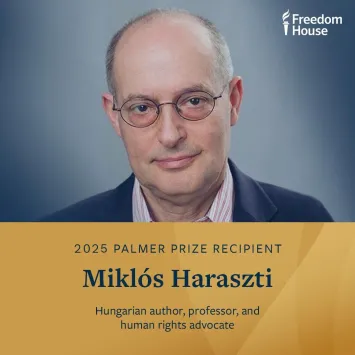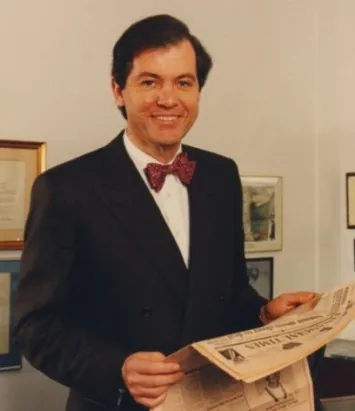
Freedom House awards the Mark Palmer Prize to diplomats and international civil servants from around the world. The prize was made possible by the Mark and Sushma Palmer Legacy Fund.
About the Mark Palmer Prize
The Mark Palmer Prize recognizes exceptional achievements to protect and advance democracy by diplomats and officials serving in intergovernmental institutions.
The award takes its name from the late Mark Palmer, a longtime Freedom House trustee and US ambassador to Hungary from 1986 to 1990. In 1989, as the Cold War was ending, Palmer boldly joined civil society and the Hungarian democratic opposition to support the country’s transition to democracy.
The Mark Palmer Prize has been awarded to diplomats and international civil servants from around the world, including Peru, the Czech Republic, Lithuania, Mongolia, Sweden, Canada, Uruguay, and the United States. The prize is made possible through the generosity of the Mark and Sushma Palmer Legacy Fund, established by Sushma Palmer in loving memory of her late husband and former Freedom House trustee Ambassador Mark Palmer.
Eligibility
The award winner must be a diplomat or official serving in an intergovernmental institution.
Nominations for the Mark Palmer Prize should document the diplomat or official’s extraordinary achievements in and support for advancing democracy and human rights by accomplishing one or more of the following:
Demonstrated support for civil society’s right to freedoms of assembly, expression, and other principles as outlined in the Warsaw Declaration of the Community of Democracies
Supported efforts to assure broader political participation
Contributed significantly to assuring free and fair elections
Sustained efforts to support human rights, including actions that resulted in a release of prisoners of conscience or an end to cruel and inhuman punishment
Facilitated a broader dialogue on democratic reform
Coordinated effective international efforts to advance democracy
Identified and articulated the importance of democratic values, despite working in a closed or authoritarian society
Contributed innovative ideas and support for the consolidation of democratic institutions in countries in transition
Upheld the idea of rule of law in countries where it is not practiced
Deadline
Submit nominations using our form or by emailing [email protected] by January 31, 2026.
Read More
Mark Palmer Prize Winners
2011: Mariusz Handzlik (Polish diplomat), Caecilia Wijgers (Dutch deputy ambassador to Cuba), Ben Rowswell (founded Canadian foreign ministry’s Democracy Unit), James McGee (US ambassador to Zimbabwe), Ajai Malhotra (Deputy Permanent Representative of India to the UN), Ernesto Pinto-Bazurco Rittler (chargé d’affaires of the Peruvian Embassy in Havana), Jaroslav Olša, Jr. (Czech ambassador to Zimbabwe)
2013: Stefan Eriksson (Swedish ambassador to Belarus), J. Christopher Stevens (US ambassador to Libya), Suren Badral (Mongolian ambassador-at-Large; coordinator for the Mongolian Presidency of the Community of Democracies)
2015: Petras Vaitiekūnas (Lithuanian minister of foreign affairs), Charlotta Sparre (Swedish ambassador to Jordan), Stephen Robert Ford (US ambassador to Syria)
2016: Luis Almagro (Organization of American States Secretary General), Deborah Lyons (former Canadian ambassador to Afghanistan)
2017: Maria Leissner (Secretary General of Community of Democracies; Swedish ambassador-at-large for democracy)
2019: Chrystia Freeland (Canadian deputy prime minister)
2021: Linas Linkevičius (former Lithuanian minister of foreign affairs)
2022: Emine Dzhaparova (first deputy minister of foreign affairs of Ukraine)
2023: Michael McCarthy (US ambassador to Liberia)
2024: Operation Nica Welcome, (US Department of State and the US Agency for International Development)
2025: Miklós Haraszti, (Hungarian author, professor, and diplomat)

The late Ambassador Mark Palmer
Active on the front lines of the struggle to help oppressed people achieve democracy in the Middle East, China, North Korea and beyond, Ambassador Mark Palmer brought an unusual set of skills, experiences, and passions to the task. Through the years of the Cold War and up to his passing in January 2013, he was one of the most respected foreign policy innovators inside and outside the U.S. Government. He served in policy positions in the State Department in the Nixon, Ford, Carter, Reagan, and George H.W. Bush administrations, including as Deputy Assistant Secretary of State for the Soviet Union and Eastern Europe and then U.S. Ambassador to Hungary during the crucial period for bringing down Europe’s communist dictators. From the outside, he worked with both the Clinton and George W. Bush Administrations, helping persuade them to initiate new democracy policies, including the Community of Democracies, and abolishing the so-called Arab exception, for the first time promoting democracy in the Arab world.

He had practical experience inside dictatorships, working directly with dictators, and helping to oust them without a shot being fired. He lived for 11 years in the Soviet Union, Yugoslavia, and Hungary under the communists as a student and diplomat. He organized and participated in the first Reagan-Gorbachev summit as the State Department's top "Kremlinologist," and as the U.S. Ambassador to Hungary helped persuade its last dictator to leave power. He was active on China and the Middle East, for example, as the founding board member of an organization to support the largest movement for change in China, and working to support the emergence of politically independent commercial television stations throughout the Arab world, including addressing a meeting on media and democracy for the region which was held in Qatar in April 2003.
From his days in the U.S. Civil Rights Movement as a member of the Student Non-Violent Coordinating Committee, through demonstrating in the streets of Budapest as ambassador, to marching with the students in Belgrade against Milosevic in 1996, he witnessed and practiced the power of organized nonviolent force in achieving freedom and justice. After the fall of the Berlin Wall, Ambassador Palmer became a successful venture capitalist and investor in the former communist countries. He realized the potential of business in the transition to democracy. He co-founded Central European Media Enterprises, which financed and launched the first national independent television stations in the Czech Republic, Slovakia, Slovenia, Romania, and Ukraine, and built a major real estate complex at Checkpoint Charlie in Berlin. He was also President of Capital Development Company LLC, which from 1990 to 2012 invested in the United States and overseas.
Ambassador Palmer was a recognized writer and advocate, having written speeches for six Secretaries of State and three Presidents, including as principal speechwriter for Henry Kissinger. He conceived and co-authored President Reagan’s speech to the British Parliament in 1982 which led to the establishment of the National Endowment for Democracy. As a long-serving Vice Chairman of the Board of Freedom House, he was a frequent contributor to published appeals and policy statements, and participant in democracy programs in the United States and across the arc of dictatorships stretching from China, through the Middle East and Africa, on to Belarus and Cuba. He is the author of “Breaking the Real Axis of Evil: How to Oust the World’s Last Dictators by 2025,” whose policy recommendations formed the basis for the ADVANCE Democracy Act of 2007.
Ambassador Palmer majored in Russian Studies at Yale University, graduating in 1963 Phi Beta Kappa and Magna Cum Laude.
The Mark Palmer Distinguished Fellow
The Mark Palmer Distinguished Fellow, a position currently held by Freedom House’s Vice President for Policy Annie Boyajian, contributes to Freedom House’s advocacy activities and events focused on bolstering human rights defenders and bringing accountability to authoritarian actors.

Sign up to receive the Freedom House weekly newsletter.


